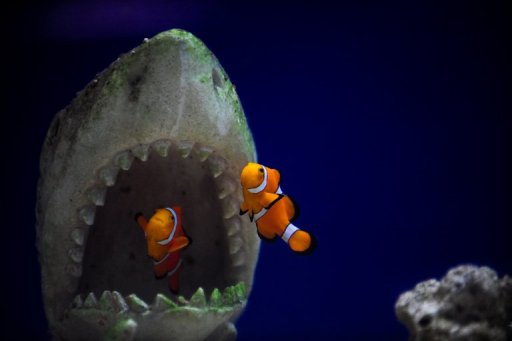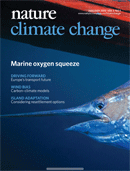
澳大利亚研究人员发现,大气和海洋中二氧化碳浓度增加可能对海洋鱼类的大脑和中枢神经产生不良作用,使鱼类失去各种生存所需的重要能力,包括听觉、嗅觉、转向、躲避天敌等。
损害能力
澳大利亚政府资助的“卓越珊瑚礁研究中心”菲利普·芒迪教授带领研究小组,在海水中溶入高浓度二氧化碳,令海水酸化,然后测试幼年小丑鱼和珊瑚鱼在天敌鱼类面前的表现。
研究人员发现,幼年小丑鱼和珊瑚鱼在这样的海水环境中受影响颇大。法新社援引芒迪的话报道:“我们的研究显示,幼年鱼的嗅觉遭水中高浓度二氧化碳损伤,意味着它们……难以察觉天敌鱼类的气味。”
研究小组随后检查鱼类听觉是否受损。鱼类借助听觉,夜间可以找到供栖息的暗礁,白天避开暗礁。芒迪说:“答案是确实受损。它们发生混乱,白天无法避开暗礁,容易成为天敌的食物。”
鱼类天生对某一方向有偏好,喜欢只朝一个方向转,就像有人惯用左手,有人惯用右手一样。研究结果显示,幼年鱼在高二氧化碳浓度的海水中未表现出转向偏好,移入普通海水片刻后表现出明显偏好,只朝一个方向转。
威胁生存
研究人员在由《自然-气候变化》近日发表的报告中写道,海水中高浓度二氧化碳可能不仅损伤鱼类的个别感官,而且影响它们整个中枢神经系统和大脑。
报告说,这项研究的重要之处在于发现了高二氧化碳浓度的海水可能使鱼类的神经传递素功能紊乱,这一变化直接威胁鱼类生存。
“我们发现,高二氧化碳浓度的海水可直接干预鱼类神经传递素的功能,使鱼类的感知和运动功能衰退,可能对海洋生物构成先前所不知道的直接威胁,”芒迪说。
他说,每年全球大约23亿吨二氧化碳最终溶入海水,而且这一数值仍在走高。二氧化碳溶入海水后多年不会分解,致使海水中二氧化碳浓度正不断增加,改变海洋生物赖以生存的海洋环境。
有待深入
美国国家海洋和大气管理局西北水产学中心神经生物学家安德鲁·迪特曼对这项研究表示赞赏。他说:“这些结果相当吸引人。”
迪特曼说,这项新发现可能解释生活在酸化水中的鱼类为何发生一些奇怪的知觉变化,譬如,为何天敌的可怕气味突然变得有吸引力。
他说,不过,研究人员需要进一步研究高二氧化碳浓度海水中鱼类细胞发生的变化,而不仅仅是行为变化。

Near-future carbon dioxide levels alter fish behaviour by interfering with neurotransmitter function
Göran E. Nilsson, Danielle L. Dixson, Paolo Domenici, Mark I. McCormick, Christina Sørensen, Sue-Ann Watson & Philip L. Munday
Predicted future CO2 levels have been found to alter sensory responses and behaviour of marine fishes. Changes include increased boldness and activity, loss of behavioural lateralization, altered auditory preferences and impaired olfactory function. Impaired olfactory function makes larval fish attracted to odours they normally avoid, including ones from predators and unfavourable habitats. These behavioural alterations have significant effects on mortality that may have far-reaching implications for population replenishment, community structure and ecosystem function. However, the underlying mechanism linking high CO2 to these diverse responses has been unknown. Here we show that abnormal olfactory preferences and loss of behavioural lateralization exhibited by two species of larval coral reef fish exposed to high CO2 can be rapidly and effectively reversed by treatment with an antagonist of the GABA-A receptor. GABA-A is a major neurotransmitter receptor in the vertebrate brain. Thus, our results indicate that high CO2 interferes with neurotransmitter function, a hitherto unrecognized threat to marine populations and ecosystems. Given the ubiquity and conserved function of GABA-A receptors, we predict that rising CO2 levels could cause sensory and behavioural impairment in a wide range of marine species, especially those that tightly control their acid–base balance through regulatory changes in HCO3− and Cl− levels.
文献链接:https://www.nature.com/nclimate/journal/vaop/ncurrent/full/nclimate1352.html








